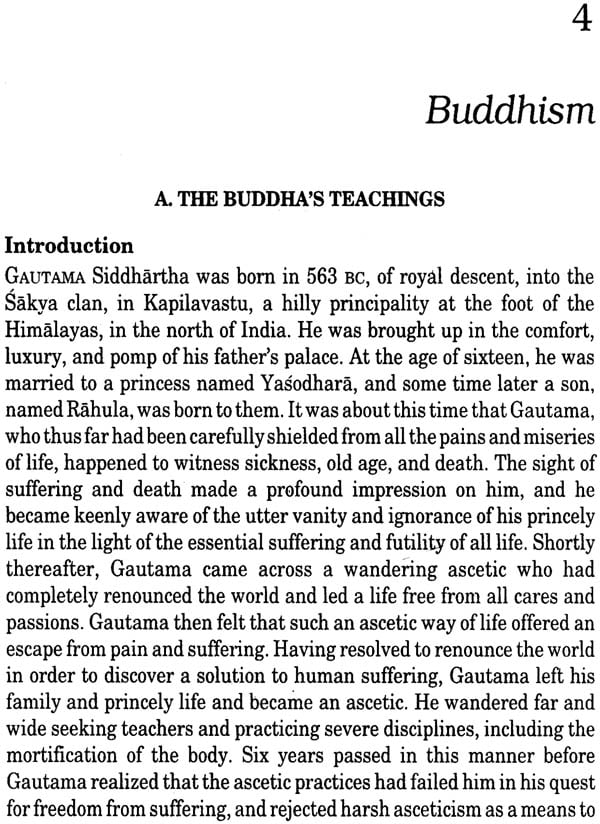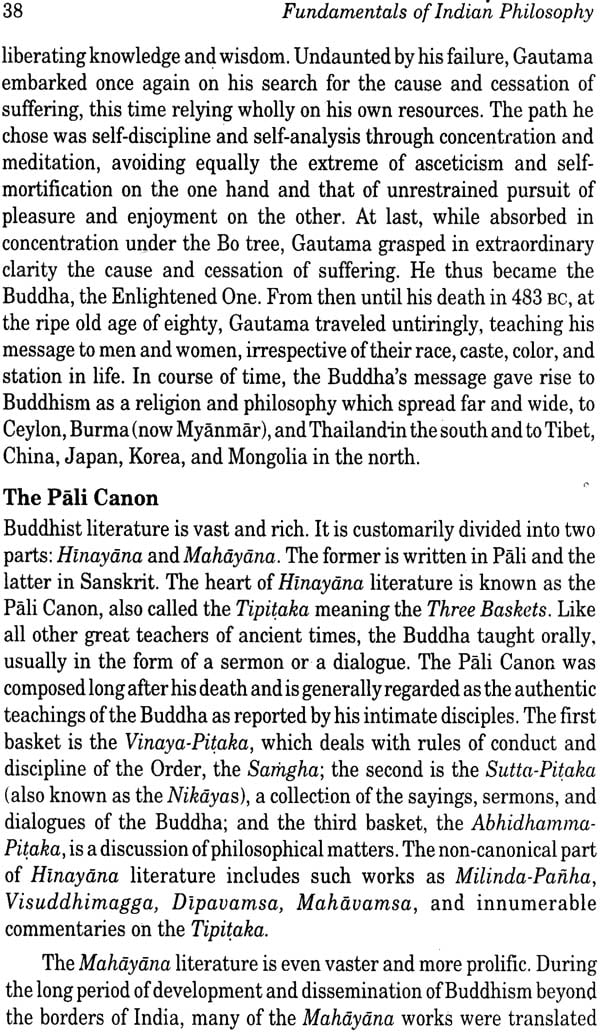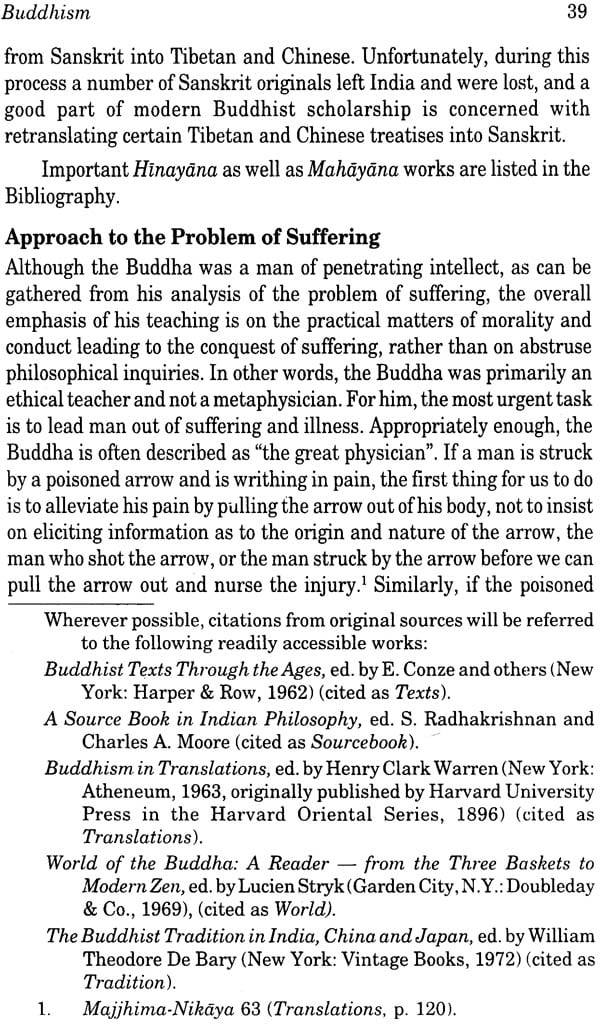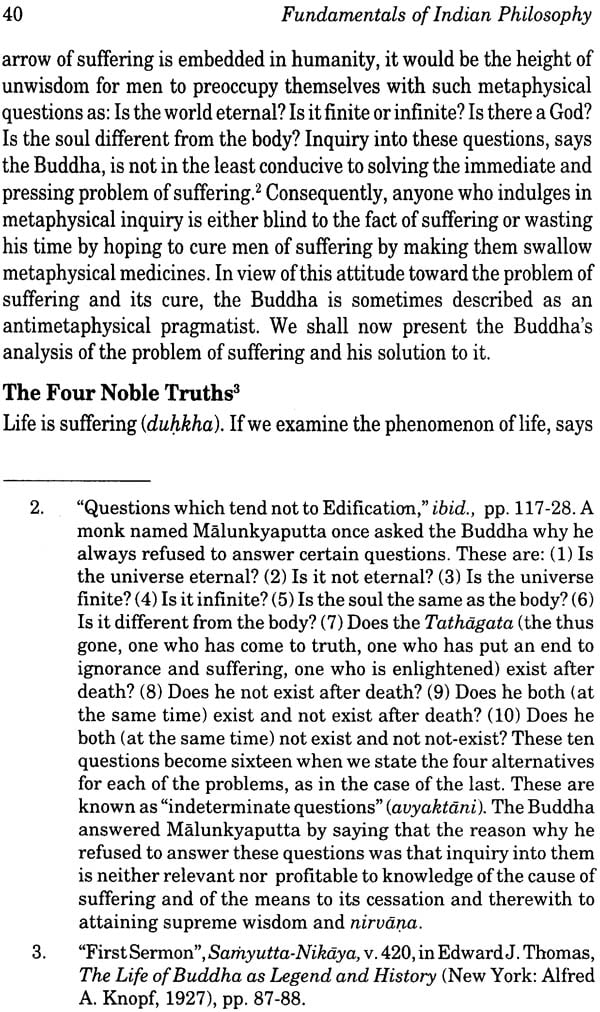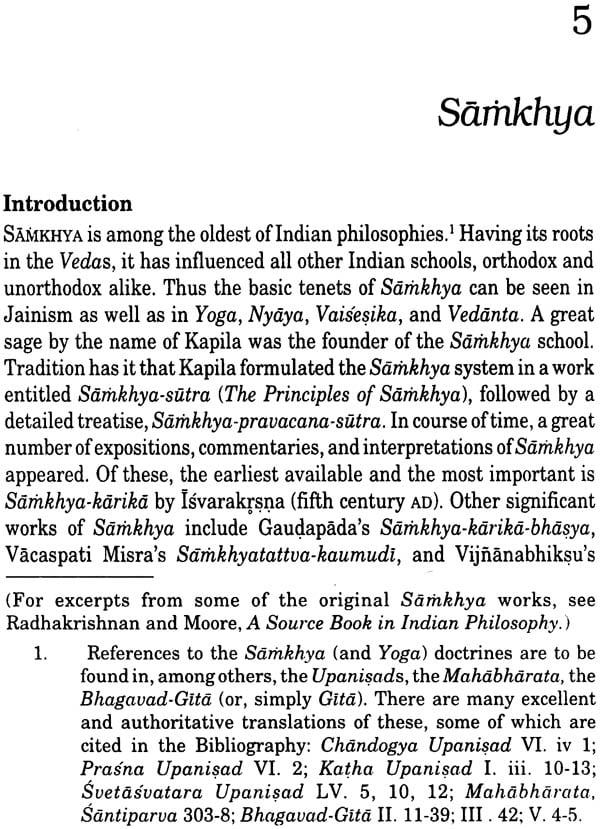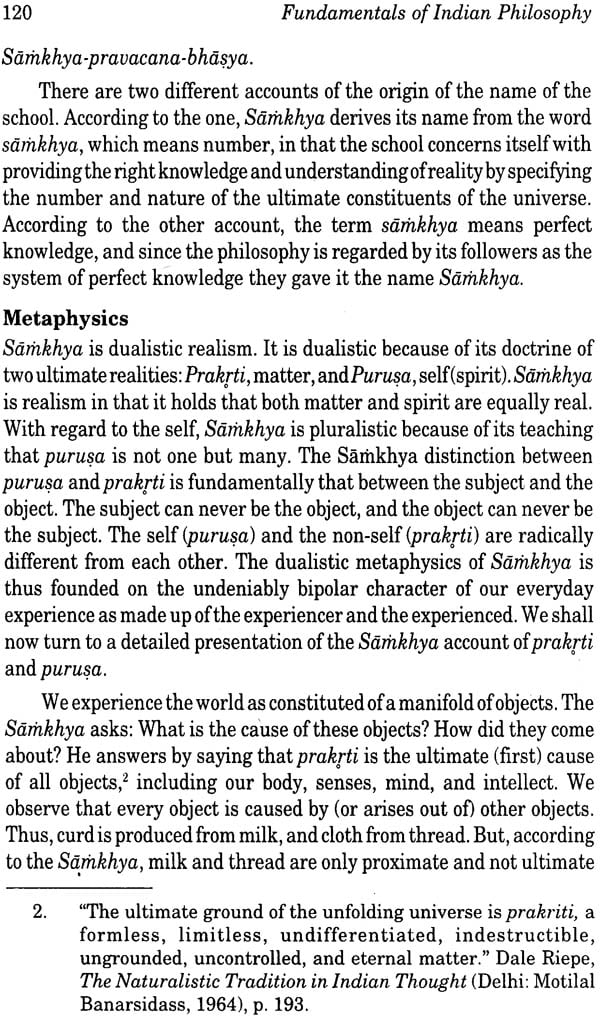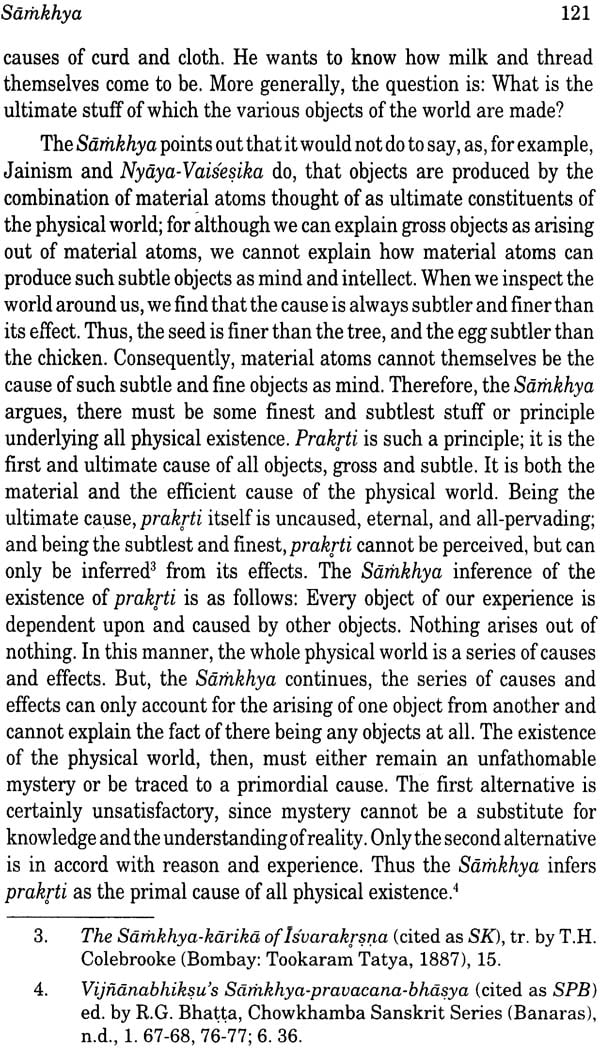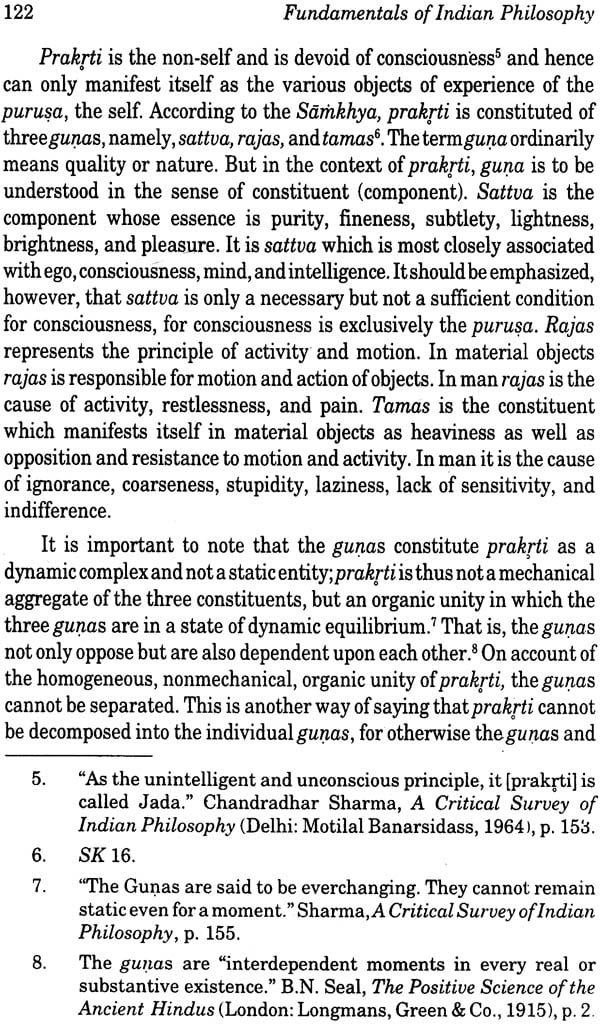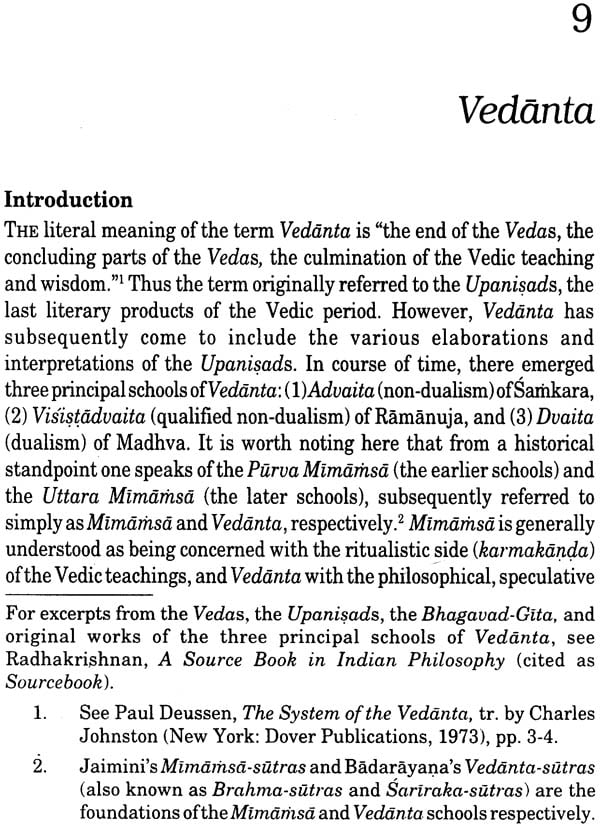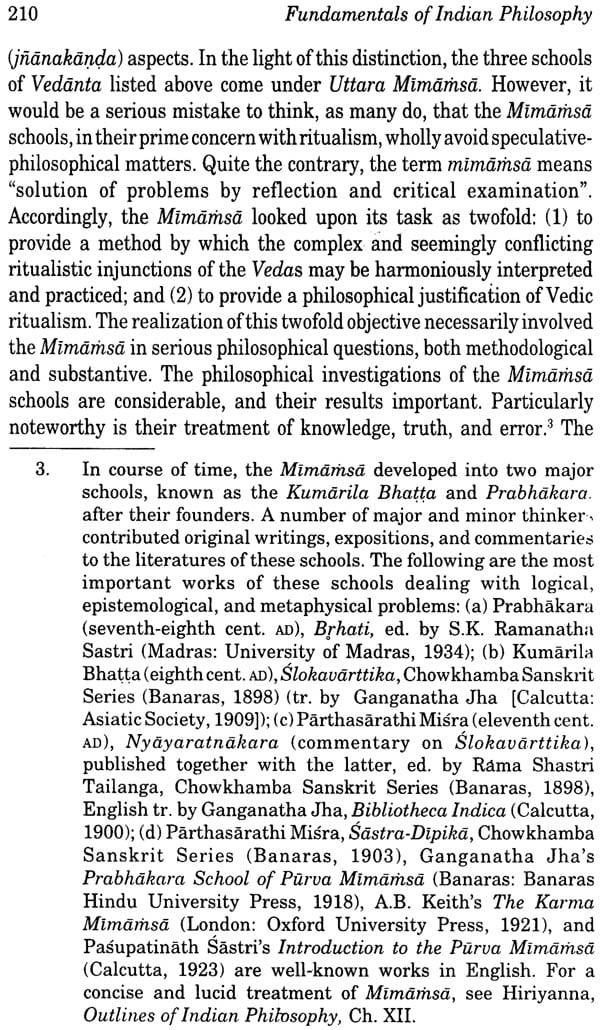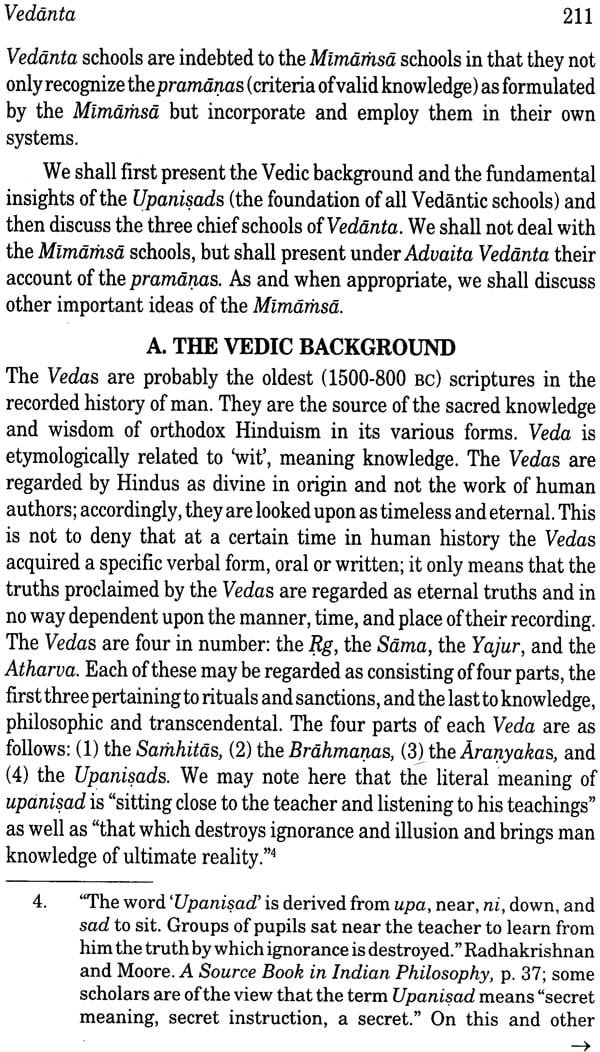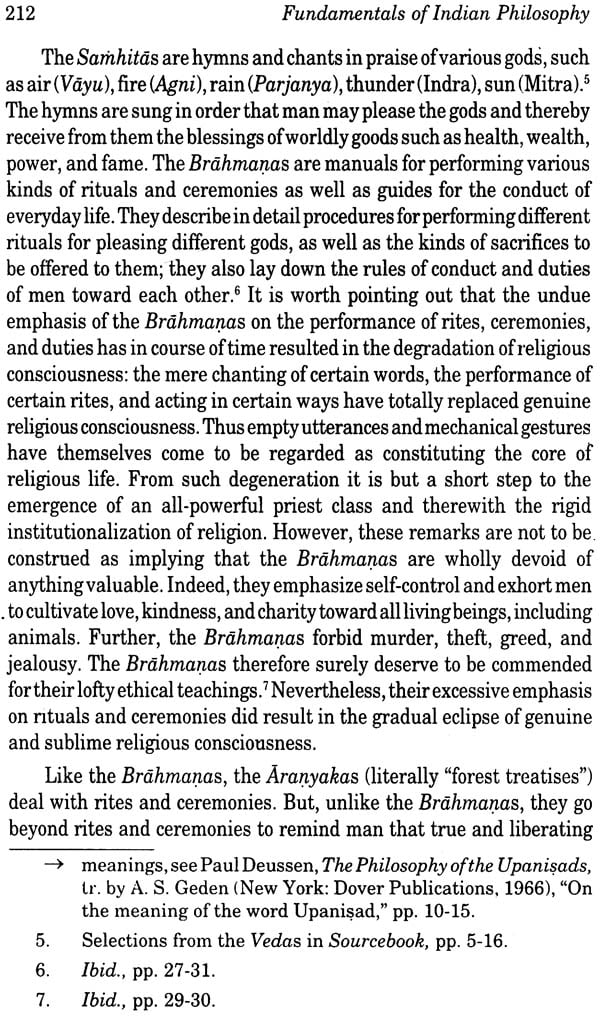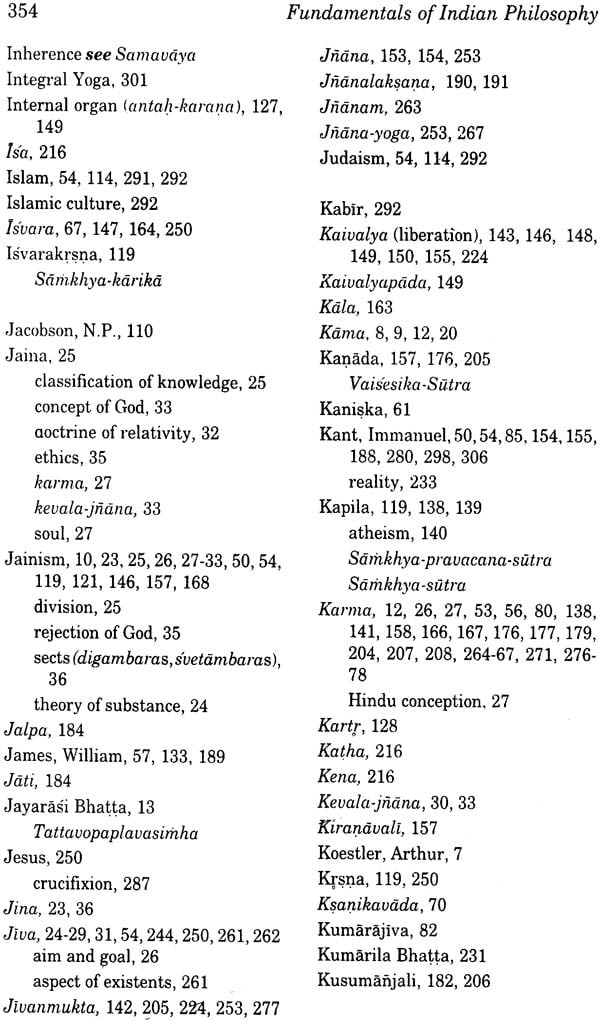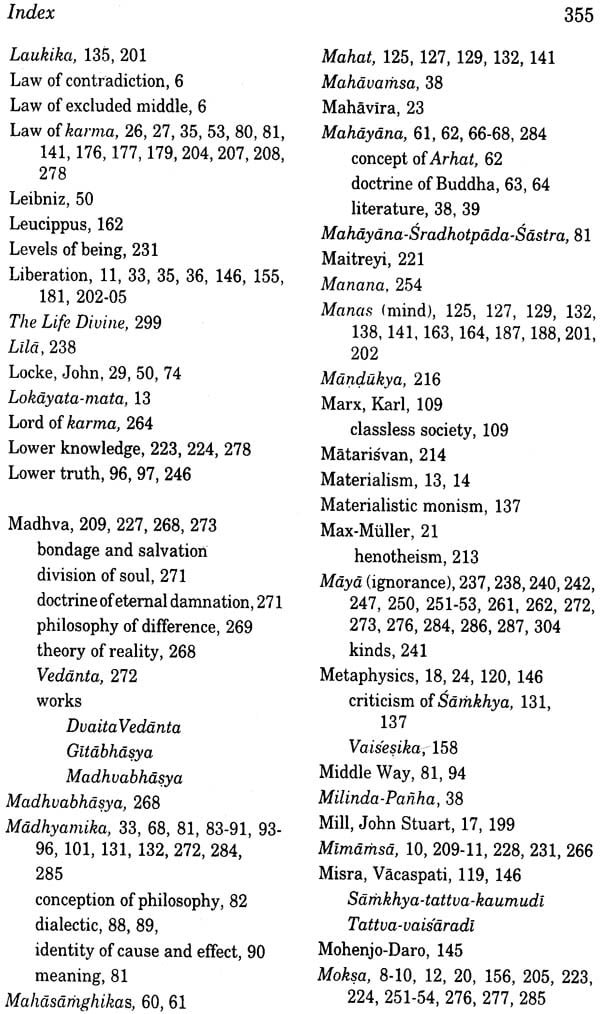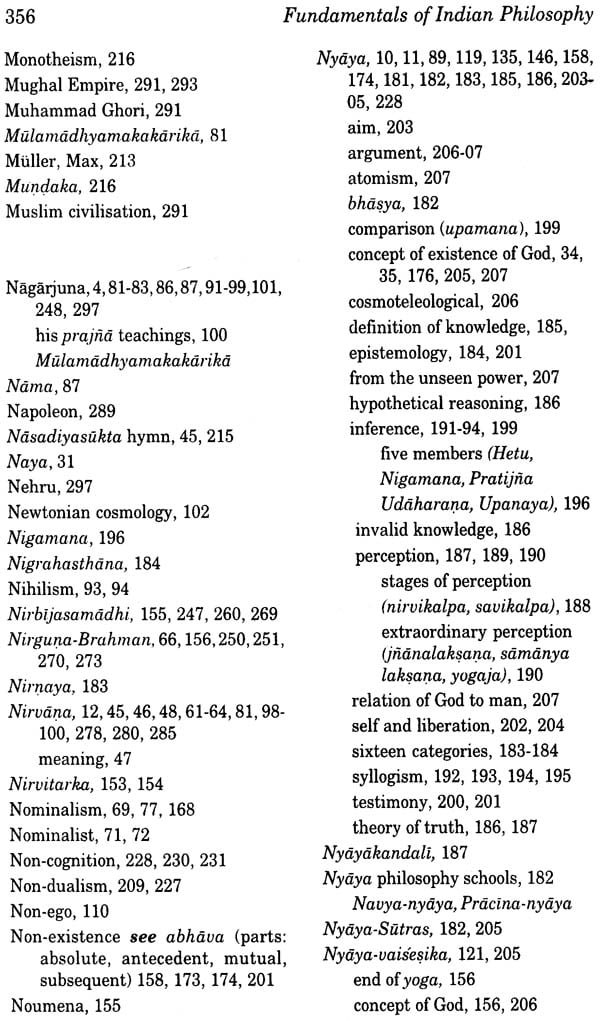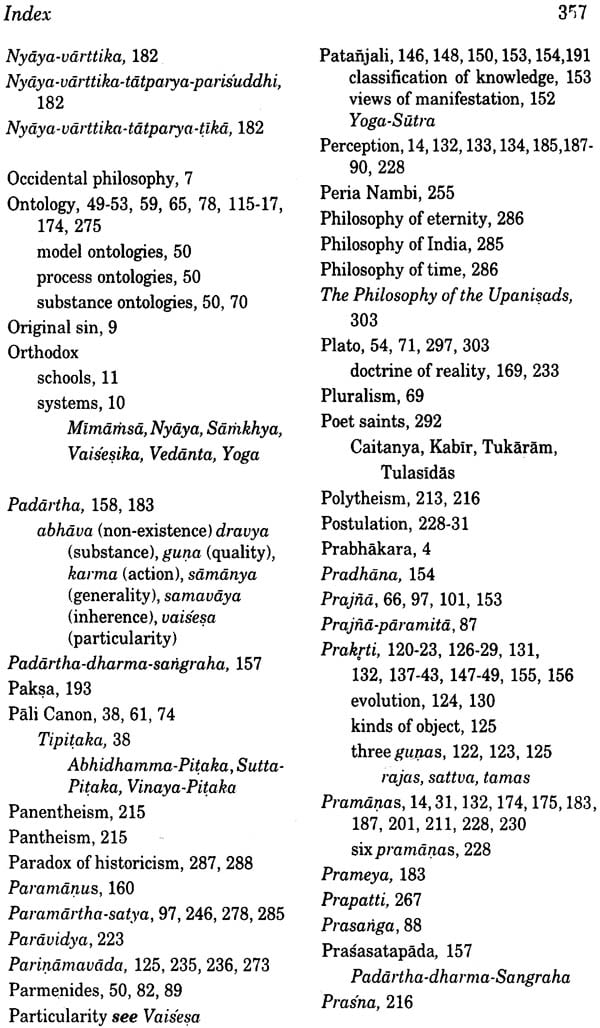
Fundamentals Of Indian Philosophy
Book Specification
| Item Code: | NAE521 |
| Author: | Ramakrishna Puligandla |
| Publisher: | D. K. Printworld Pvt. Ltd. |
| Language: | English |
| Edition: | 2008 |
| ISBN: | 9788124600863 |
| Pages: | 381 |
| Cover: | Hardcover |
| Other Details | 8.5 inch X 5.5 inch |
| Weight | 670 gm |
Book Description
Indian philosophy reflects some of the earliest thought-traditions in human history. Its foundations can be traced to ancient minds and their capacity for insatiable curiosity and constant meditation. The Indian thinkers of old aimed their pragmatic philosophies at not just the satisfaction of intellectual curiosity or pursuit of theoretical truths but actually the assimilation of intellectually discerned and established truths into one’s own personality for a life of freedom and enlightenment. This is true of modern Indian philosophers, like Sri Aurobindo and Dr. Radhakrishnan, as well. Fundamentals of Indian Philosophy reflects the vastness and richness of this philosophic tradition in a comprehensive and all-embracing yet compact presentation that lays bare the essentials of Indian philosophy.
Dr. R. Puligandla takes special care to emphasise the methods, temper and goals of Indian philosophy even while delving into the specificities. All the major schools of the philosophic tradition are objectively and thoroughly analysed — the Carvaka materialism, Jainism, Buddhism, Yoga, Vedanta — among them. The author details the undeniably bold and original ideas of the Indian thinkers — that awe the reader at times with their brilliant insight and element of truth — in an approach sincerely aimed at an all-round understanding of the basics of Indian philosophy. This survey not only introduces the readers to issues and answers but also goes to provide the necessary motivation and resources for further study.
Complete with an extensive index and a glossary of Sanskrit terms, this text book would prove to be invaluable for students keen to acquire a thorough grounding in the subject. It will also serve as an indispensable reference book for professors and scholars of Indian philosophy.
Ramakrishna Puligandla is Emeritus Professor of Philosophy at the University of Toledo, USA. He has received a B.S. degree in physics and an MS. degree in applied physics from the Andhra University in Waltair, India, and an M.S. degree in physics from the Purdue University in the US. His academic achievements in philosophy include an A.M. degree in philosophy from the University of South Dakota and a PhD in philosophy from Rice University. His areas of specialty are logic, philosophy of science, and comparative philosophy and religion, with emphasis upon the Indian and Western traditions. Dr. Puligandla, visiting professor in India in 1992, has written ten books and over seventy scholarly papers. Associated with many institutions and journals, he is a member of the American Philosophical Association, assistant editor of The Philosopher’s Index and consultant and reviewer for Choice, a publication of the Association of College and Research Libraries.
I am most gratified at the great interest in this text on the part of teachers and students as well as general readers. A continued demand for this book has necessitated the second edition.
When I wrote this book two decades ago, it was largely the needs of a Western audience that I had in mind; however, in course of time, the kind of responses I received and my own experience have made it clear that it could be equally useful to the Indian academia. This second edition thus hopes to cater to the needs of students and scholarship in India.
Some reviewers have noted that the book does not adequately deal with contemporary Indian Thinkers, there being only a brief chapter on Sri Aurobindo and Radhakrishna. I have deliberated avoided extensive treatment of contemporary Indian thinkers, not because I deem them unimportant and insignificant, but because the main and sole purpose of this text is to introduce Indian Philosophy to the beginners.
Such a purpose is best fulfilled by offering a clear treatment of the classical philosophical systems of the Indian tradition. It is my considered judgment that contemporary Indian philosophy does not replace classical thoughts, but rather builds upon the latter. A through introduction to and understanding of the classical systems is thus a necessary condition for studying subsequent developments, including contemporary thoughts. My humble purpose in writing this book is therefore to provide the beginner with the indispensable background for the further study. The same holds with respect to the study of any other tradition. Thus one can study classical Greek philosophy – the pre-Socratics, Plato, Aristotle and other thinkers – without worrying about contemporary Greek thinkers or Western philosophers in general.
There are many fine works by (and on) contemporary Indian philosophers, such as J.N. Matilal, Srinivasa Rao and Dayakrishna to mention a few. To incorporate the thought of contemporary Indian philosophers into an introductory text is not only unnecessary but extremely complicated (since the beginner also needs to know the backgrounds of contemporary thinkers and their points of departure, such as logical, phenomenological, existential, religious). It is for these reasons that I close to limit myself to the treatment of the classical system.
A few changes in regard to the organization of the material have been made in this edition. The end-notes have been presented as footnotes to follow for ready reference. The Guide to Pronunciation has been translated to the beginning pages, so that the reader can familiarize himself with the use of diacritical marks at the very outset. Typographical errors in the previous edition have been corrected.
The reader is hereby requested to understand the terms ‘man’, ‘he’ and ‘his’ as referring to the human being in general, irrespective of gender.
It is no exaggeration to say that in American college and universities the past decades has been one of unprecedented interest in the history, philosophies, and religions of Asia. During this period, many colleges and universities have either established departments of Asian studies or strengthened and enlarged the already existing ones. Departments of philosophy and religion have introduced courses pertaining to India, China and Japan in which more and more students enroll. Among the various courses, those dealing with India are usually in great demand and accordingly draw a large number of students. Although there are many excellent books on Indian philosophy such as S. Radhakrishna’sIndian Philosophy, Hiriyanna’s Outlines and Essentials, Chandradhar Sharma’s Critical Survey and Chatterjee and Datta’s Introduction, there are practically none suitable for a quarter or semester introductory course. The few anthological that are available can not profitably be used in a beginning course. The present book is intended have grown out of my experience in teaching a course in Introduction to Eastern Thought for the past seven years at the University of Toledo.
This book does not presuppose any background in philosophy although those with such a background will be able to readily identify the problem in Indian philosophy and compare them with their counterparts in Western philosophy. The main aim of this book is not only to introduce the student to the problems, methods, goals and temper of Indian philosophy, but also to arouse in him or her sufficient interest in the subject to undertaken further study of Indian philosophy and culture. If the present book succeeds in this modest objective, I will have been justified in writing it.
| Preface to the Second Edition | vii | |
| Preface to the First Edition | ix | |
| Acknowledgements | xv | |
| Guide to Pronunciation | xvii | |
| 1 | General Introduction | 1 |
| 2 | Carvakism: Materialism | 13 |
| Introduction | 13 | |
| Epistemology | 14 | |
| Metaphysics | 18 | |
| Ethics | 20 | |
| 3 | Jainism | 23 |
| Introduction | 23 | |
| Metaphysics | 24 | |
| Epistemology | 30 | |
| God And Liberation | 33 | |
| Ethics | 35 | |
| 4 | Buddhism | 37 |
| A | The Buddha's Teachings | 37 |
| Introduction | 37 | |
| The Palicanon | 38 | |
| Approach To The Problem Of Suffering | 39 | |
| The Four Noble Truths | 40 | |
| Niravana | 46 | |
| B | Philosophical Foundations Of The Buddha's Teachings | 49 |
| Introduction | 49 | |
| Process Ontology, Dependent Origination, And Impermanence | 49 | |
| The Doctrine Of Karma | 53 | |
| The Doctrine Of Non-Self (Anatta) | 53 | |
| C | Buddhist Schools of Philosophy | 60 |
| The Hinayana-Mahayana Division | 60 | |
| The Varighasika School | 68 | |
| The Sautrantika School | 74 | |
| The Yogacara School | 77 | |
| The Madhayamika School | 81 | |
| D | Buddhist Psychology and Ethics | 101 |
| The Concept Of Identity | 101 | |
| Psychological Significance Of The Concept Of Identity | 104 | |
| 5 | Samkhya | 119 |
| Introduction | 119 | |
| Metaphysics | 120 | |
| Epistemology | 132 | |
| God | 138 | |
| Bondage And Salvation | 141 | |
| 6 | Yoga | 145 |
| Introduction | 145 | |
| Metaphysics And Epistemology | 146 | |
| Structure Of The Yoga-Sutras | 148 | |
| Yogic Meditation | 149 | |
| Dharana - Dhyana - Samadhi | ||
| Yogic Knowledge | 153 | |
| Kaivalya (Liberation) | 155 | |
| Concluding Remarks | 155 | |
| 7 | Vaisesika | 157 |
| Introduction | 157 | |
| Metaphysics And The Categories | 158 | |
| Epistemology | 174 | |
| God | 176 | |
| Bondage And Libration | 177 | |
| 8 | Nyaya | 181 |
| Introduction | 181 | |
| The Sixteen Categories (Padarthas) | 183 | |
| Epistemology | 184 | |
| Perception - Inference - comparison (upamana - testimony (Sabda) | ||
| Metaphysics | 201 | |
| Self And Liberation | 202 | |
| God | 205 | |
| 9 | Vedanta | 209 |
| Introduction | 209 | |
| A | The Vedic Background | 211 |
| B | The Upanisads | 216 |
| Brahman | 217 | |
| Atman | 221 | |
| Knowledge And Freedom (Moksa) | 223 | |
| C | Schools Of Vedanta | 227 |
| Introduction | 227 | |
| Advaita vedanta: Non - Dualism | 227 | |
| Introduction-Pramanas-Samkara's Theory of Reality-Two Kinds of Knowledge-God-Bondage and Freedom (Moksa) | ||
| Visistadvaita Vedanta: Qualified Non - Dualism | 255 | |
| Introduction - Brahman and Selves - Maya - God - Bondage and Salvation | ||
| Dvaita Vedanta: Dualism | 268 | |
| Introduction -Theory of Reality - God - bondage and Salvation | ||
| Concluding Remarks | 272 | |
| 10 | Time and History in the Indian Tradition | 275 |
| Introduction | 275 | |
| Basic Concepts Of Advaita Vedanta | 276 | |
| Basic Concepts Of Buddhism | 278 | |
| Implications To History | 278 | |
| 11 | A Gliumpse at the Contemporary Scene | 291 |
| Introduction | 291 | |
| Sri Aurobindo | 298 | |
| S. Radhakrishna | 303 | |
| Bibliography | 309 | |
| Glossary | 333 | |
| Index | 349 |
